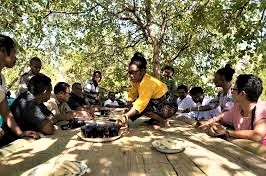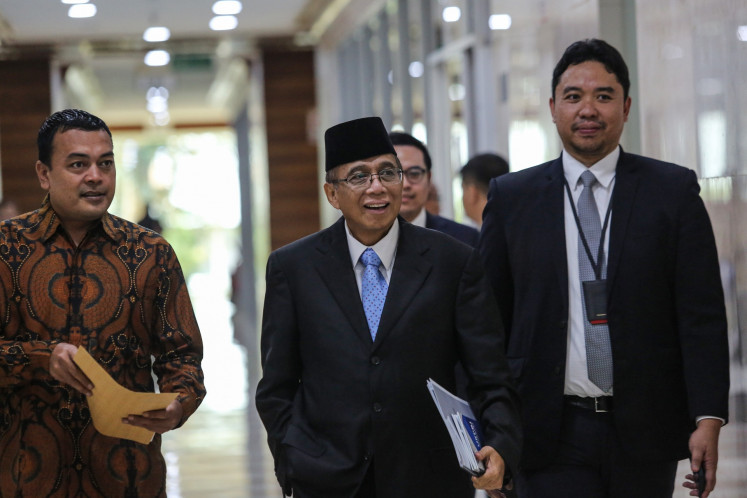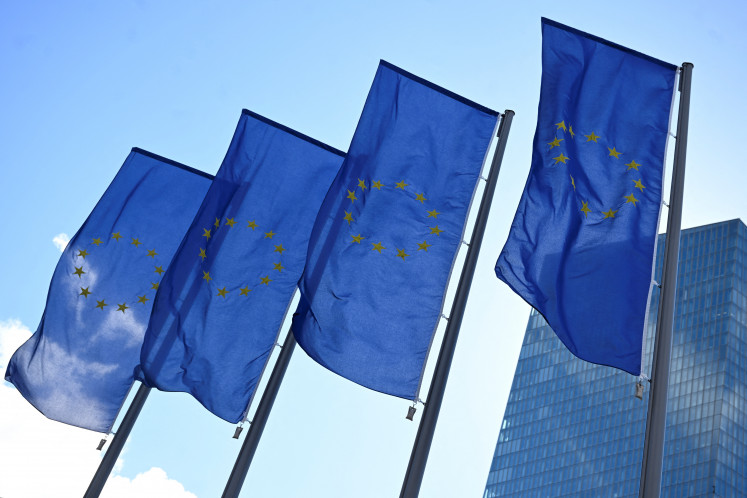Popular Reads
Top Results
Can't find what you're looking for?
View all search resultsPopular Reads
Top Results
Can't find what you're looking for?
View all search resultsAdvancing SDGs: The role of philanthropy
According to a UN estimate, Indonesia must fill an SDG funding gap of US$4.7 trillion to reach its SDGs in 2030.
Change text size
Gift Premium Articles
to Anyone
Indonesia is the most generous country in the world, ranking first with a score of 69, according to Charities Aid Foundation’s 2021 World Giving Index (WGI). That was an increase from the score of 59, the last time the WGI was published in 2018. Indonesia also ranked first in the world then.
The index also shows Indonesia’s rate of volunteering is more than three times the global average, indicating the spirit of gotong-royong, the age-old practice of mutual aid, remains strong, particularly during times of disasters, such as the current period of the COVID-19 pandemic.
We are very proud of Indonesia’s record of generosity and applaud its achievement, as time after time, it has helped to overcome disasters, great and small, that have occurred in the country. But that is only part of the story.
Indonesian generosity, massive as it is, tends to be ad hoc, personal and informal. Giving is mostly religion-oriented and tends toward welfare areas compared with such areas as education, health or the environment. Indonesians prefer to donate directly to those in need rather than to organizations aiming to achieve beneficial long-term change in our society.
The United Nations 2030 Agenda for Sustainable Development is a long-term global program, adopted in 2015, by all United Nations member states, including Indonesia. The core of the 2030 Agenda is the 17 Sustainable Development Goals (SDGs) that are urgent calls for action for all countries – developed and developing – to end poverty by 2030.
This is to be attained through individual country strategies to reach their respective SDG commitments by, among other measures, improving health and education, reducing inequality, producing economic growth and mitigating the impact of climate change through the preservation of our oceans and forests.
As the road map of SDGs Indonesia issued by the National Development Planning Ministry/National Development Planning Agency (Bappenas) states, “Accomplishing SDGs is also accomplishing Indonesia’s development agenda. Indonesia is putting its best effort to mainstream SDGs into its development policies and targets, and to ensure their implementation on the ground. These ambitious goals must be achieved, but it needs collaborative actions among stakeholders, shared contributions, as well as innovative approaches and strategies.”
In this context, the Indonesian government issued a presidential decree (Perpres) in 2017 that formally established the SDGs secretariat under the National Development Planning Ministry as the focal point for the implementation of SDGs in Indonesia. Through Perpres No. 59/2017, Indonesia is committed to mainstreaming the SDGs into the national development strategy, which meant the 17 goals were translated into the national development agenda, based on the four pillars of the National Long-Term Development Plan (RPJPN), 2005-2025: robust legal and political institutions, increasing wealth and prosperity, more advanced and sustainable economic structures and biodiversity preservation.
Philanthropy has been widely recognized globally as one of the building blocks for achieving the SDGs. In Indonesia, the National Development Planning Ministry also acknowledges the role of philanthropy, stating in its road map, “Achieving the SDGs requires a surge in financing and investments. The new financing strategy is a necessity to help accelerate progress and complement efforts being made by champions of financing for sustainable development and longer-term investments from the private sector, philanthropy and other sources of innovation.”
The national development planning minister, mandated as the implementation coordinator is supported by, among others, an implementation team and four working groups (social development, economic development, environmental development, and justice and governance). The membership of the implementation team and the working groups includes government representatives, as well as nonstate actors, such as civil society organizations, media, business, academia and philanthropic organizations, of which Filantropi Indonesia (FI), or the Indonesian Philanthropy Association, is one.
According to a UN estimate, Indonesia must fill an SDG funding gap of US$4.7 trillion to reach its SDGs in 2030. The private sector and philanthropy, individual and institutional, are expected to help make up for the shortfall.
However, institutional philanthropy accounts for only a small segment of the philanthropic sector in Indonesia. Part of the reason is that many philanthropists, after giving for a few years out of their finite resources, wonder what their giving does to better social conditions, the economy, or the environment.
At the same time, philanthropy should not be confused with charity. Charity is short-term and reactive – individual responses focusing on social needs to aid-dependent communities. Philanthropy, on the other hand, focuses on long-term solutions to issues of social change. It is proactive within a framework of organized collective actions that empower independent communities.
It is in this context, FI made the strategic decision in 2015 to link the vision of the association with the SDGs. We did so as one of its key tenets is the independence of the countries involved in the pursuit of their SDG commitments to 2030.
The SDGs explicitly leave it up to the countries themselves to decide on the actions needed to achieve national commitments. For those philanthropists who wonder about the results of their giving, the SDGs provide accountability based on what the country has committed to achieving.
FI is a nonprofit and independent institution to advance philanthropy in Indonesia and contribute to the achievement of social justice and sustainable development in Indonesia, based on “a spirit of partnership, equality, plurality, justice, philanthropy universalism and Indonesian identity”. The SDG Philanthropy Platform which we established in 2016 provides the continuous practical and technical aspects of integrating the SDGs into the strategies of FI and its partners.
To support its mission, FI established the “Philanthropy Hub” as the center point of its work, intended to mobilize collective action (gotong-royong) and build a strong community of philanthropists that encourages sharing of lessons learned and best practices. It also catalyzes and nurtures philanthropic leadership by way of co-creation and collaboration. Currently, the hub is intended to build a robust impact-monitoring system to track our shared goals toward the SDGs.
Finally, and not least, the hub will support the shaping of innovative financing that will accelerate the achievement of the SDGs.
As cofounder and advisory board chair of FI, Franky Welirang, points out, “Charity is giving. Philanthropy is acting. […] we strongly believe when all stakeholders play an active role in building our communities, Indonesia can accelerate the implementation of the SDGs for the benefit of Indonesia. We invite all Indonesians to join us in effecting the change we need to make Indonesia the prosperous and just society it deserves to be.”
***
The writer is chair of the executive board at Filantropi Indonesia and Indonesia Southeast Asia regional director for the Tropical Forest Alliance.










